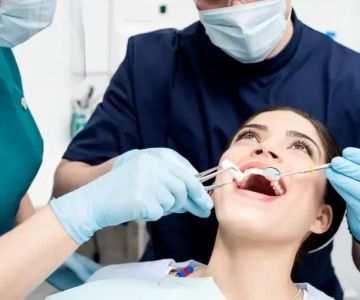Dental Emergencies and Their Urgency
A dental emergency is any situation that requires immediate attention. This could include severe toothache, badly cracked tooth, knocked-out tooth, extruded tooth, dental abscess, lost or broken dental restoration, or severe soft tissue injury. For instance, a severely cracked tooth or a knocked-out tooth demands prompt action. Saving and rinsing any broken pieces of the tooth and seeking dental care as soon as possible is crucial. In cases of a dental abscess, which is a serious condition that can cause damage if left untreated, seeking treatment promptly is necessary.
When to Seek Immediate Dental Care
In most cases of dental emergencies, such as a broken or knocked-out tooth, your dentist will treat you in their office. However, for more serious injuries like broken facial bones, going directly to the emergency room is the right choice. Uncontrolled bleeding, severe pain, or broken facial bones after a dental injury indicate the need for immediate professional attention.
Managing Symptoms Before Seeing the Dentist
There are steps you can take to manage symptoms while waiting for a dental appointment. For a severe toothache, rinsing your mouth with warm water, using dental floss, applying a cold compress, and taking over-the-counter pain relievers can offer some relief. Small chips or cracks in teeth might not require immediate attention, but covering sharp edges with orthodontic wax can prevent irritation. Broken braces usually aren't emergencies unless there's bleeding, but if a wire is poking, gently bending it and covering it with wax is advisable.
The Importance of a Same-Day Dentist Visit
Finding a same-day dentist is vital in cases of serious dental trauma. A same-day appointment can prevent a serious condition from worsening and offers various treatment options. For example, a broken tooth can increase the risk of infection and requires appropriate treatment like a root canal and crown placement. Losing a permanent tooth is a dental emergency, and a same-day dentist can determine the best course of action, such as dental implants or partial dentures. Severe bleeding from a mouth injury also warrants an immediate visit to a same-day dentist.
Post-Treatment Instructions for Dental Injuries
After a dental injury, it's important to keep the teeth clean by gently brushing twice a day. Consuming soft foods like yogurt, mashed potatoes, soup, gelatin, and pudding for 2 to 3 weeks is advisable. Avoiding extreme temperatures in food is also essential. Taking over-the-counter pain relievers like ibuprofen (Advil®) or acetaminophen (Tylenol®) can help with pain, but following the correct dosage for your child's age is crucial. Even if a tooth doesn't hurt after the injury, regular dental check-ups at specific intervals are necessary to prevent long-term damage or tooth loss. If your child has a fever over 102°F (38.9°C) and appears very ill, contact the dental clinic promptly.
In conclusion, after a tooth injury, it's not always straightforward to determine if it's safe to wait for a dental appointment. Understanding the nature and severity of the injury, along with knowing the appropriate actions to take and when to seek immediate care, is essential for maintaining good oral health. Whether it's a minor issue or a serious emergency, being informed and proactive can make a significant difference in the outcome of dental treatment.



 RiverRock Dental
RiverRock Dental Catonfield Dental
Catonfield Dental Molen Orthodontics
Molen Orthodontics Nashua Dentistry and Orthodontics for Children
Nashua Dentistry and Orthodontics for Children Dr. Glen's Happy Teeth
Dr. Glen's Happy Teeth St. Bernard Hospital Dental Center
St. Bernard Hospital Dental Center The Importance of Oral Health Education During Pregnancy for a Healthy Pregnancy
The Importance of Oral Health Education During Pregnancy for a Healthy Pregnancy Why Skipping Dental Checkups Can Lead to Bigger Oral Health Problems
Why Skipping Dental Checkups Can Lead to Bigger Oral Health Problems Advantages of Porcelain Dental Restorations
Advantages of Porcelain Dental Restorations Best Tips for Brushing Your Teeth Properly for Healthy Gums: Essential Techniques for Oral Health
Best Tips for Brushing Your Teeth Properly for Healthy Gums: Essential Techniques for Oral Health How Can Diabetes Cause Tooth and Gum Problems? Preventing and Managing Oral Health Issues
How Can Diabetes Cause Tooth and Gum Problems? Preventing and Managing Oral Health Issues Healthy Habits for Promoting Good Oral Health and Hygiene: Tips for a Healthy Smile
Healthy Habits for Promoting Good Oral Health and Hygiene: Tips for a Healthy Smile